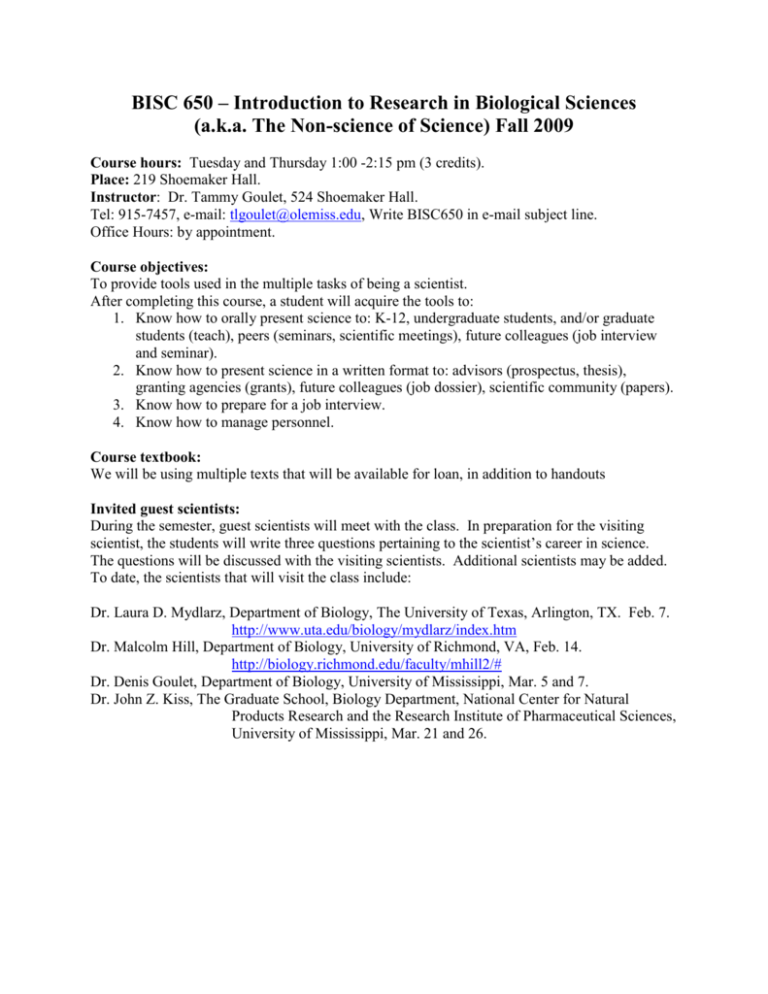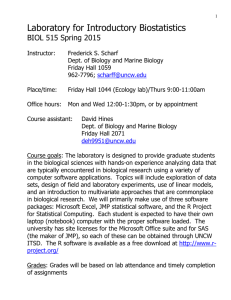BISC 650 - Biology - University of Mississippi
advertisement

BISC 650 – Introduction to Research in Biological Sciences (a.k.a. The Non-science of Science) Fall 2009 Course hours: Tuesday and Thursday 1:00 -2:15 pm (3 credits). Place: 219 Shoemaker Hall. Instructor: Dr. Tammy Goulet, 524 Shoemaker Hall. Tel: 915-7457, e-mail: tlgoulet@olemiss.edu, Write BISC650 in e-mail subject line. Office Hours: by appointment. Course objectives: To provide tools used in the multiple tasks of being a scientist. After completing this course, a student will acquire the tools to: 1. Know how to orally present science to: K-12, undergraduate students, and/or graduate students (teach), peers (seminars, scientific meetings), future colleagues (job interview and seminar). 2. Know how to present science in a written format to: advisors (prospectus, thesis), granting agencies (grants), future colleagues (job dossier), scientific community (papers). 3. Know how to prepare for a job interview. 4. Know how to manage personnel. Course textbook: We will be using multiple texts that will be available for loan, in addition to handouts Invited guest scientists: During the semester, guest scientists will meet with the class. In preparation for the visiting scientist, the students will write three questions pertaining to the scientist’s career in science. The questions will be discussed with the visiting scientists. Additional scientists may be added. To date, the scientists that will visit the class include: Dr. Laura D. Mydlarz, Department of Biology, The University of Texas, Arlington, TX. Feb. 7. http://www.uta.edu/biology/mydlarz/index.htm Dr. Malcolm Hill, Department of Biology, University of Richmond, VA, Feb. 14. http://biology.richmond.edu/faculty/mhill2/# Dr. Denis Goulet, Department of Biology, University of Mississippi, Mar. 5 and 7. Dr. John Z. Kiss, The Graduate School, Biology Department, National Center for Natural Products Research and the Research Institute of Pharmaceutical Sciences, University of Mississippi, Mar. 21 and 26. BISC 650 Course outline: DATE Jan 24 Jan 29 Jan 31 Feb 5 Feb 7 Feb 12 Feb 14 Feb 19 Feb 21 Feb 26 Feb 28 Mar 5 Mar 7 Mar1214 Mar 19 Mar 21 TOPIC Library resources Finding grants Introduction; Time management in Science Role of TA/new course What is a CV? Presenting science Career paths in Biology Tenure & duties Grants/prospectus Career paths in Biology Scientist as a CEO How to evaluate science Teaching & learning styles Ten Commandments of Effective Presentation Class presentations / discussions Career paths in Biology Powerpoint presentations Reference citations Spring Break Mar 26 Class presentations / discussions Career paths in Biology The process of peer review The process of peer review Mar 28 Apr 2 Apr 4 Apr 9 Apr 11 Apr 16 Apr 18 Apr 23 Apr 25 Apr 30 May 9 Class presentations / discussions Web pages Class presentations / discussions Job Dossier Class presentations / discussions Academic Ethics Class presentations / discussions Equity in Science Class presentations / discussions Job interview & negotiation Class presentations NOTES Ms. Buffy Choinski Shoe 225. Handouts Bring your CV to class Handouts Visit by Dr. Laura Mydlarz Associate Professor Find a grant that you can apply for. Visit by Dr. Malcolm Hill Assoc. Dean Handouts Dr. Denis Goulet Handouts Bring 5 of your references. Dr. Denis Goulet (Shoe 225) Dr. John Z. Kiss, Dean of the Graduate School, Ole Miss Dr. John Z. Kiss, Dean of the Graduate School, Ole Miss Bring web page you like Handouts Handouts AT NOON 2 BISC 650 Course requirements: Grade divided among the three categories: 1. 35% - Attendance and participation which include written critiques – a. In the course (includes hand in peer critiques). b. In departmental seminars (hand in critiques). c. In one writing workshop (hand in 1/2 page summary). The link bellow is for the Fall 2012 semester. I will update when the Spring 2012 schedule is posted. http://cwr.olemiss.edu/writing-centers/workshops/ 2. 40% - Written assignments – a. Job portfolio (CV, teaching and research interests) b. Prospectus, article, grant, as appropriate c. Web page 3. 25% - Oral presentations a. 5 min. undergraduate level teaching b. 12 min. presentation on research or research to be (in Powerpoint) Written and oral assignments will be due throughout the semester. Due dates will be announced in class. How the course fosters independent learning: A scientist independently manages their time to accomplish their responsibilities (research, teaching, overseeing a lab). This course will provide the essential tools to enable the students to independently address the responsibilities of a scientist. Disability Accommodations: It is University policy to provide, on a flexible and individual basis, reasonable accommodations to students who have disabilities that may affect their ability to participate in course activities or meet course requirements. Students with disabilities, which have been verified through the Office of Student Disability Services, are encouraged to contact their instructors to discuss their individual needs for accommodations. Academic misconduct and its consequences: According to UM Academic Conduct and Discipline policy: “Dishonesty, cheating, or plagiarism, or knowingly furnishing false information to the University are regarded as particularly serious offenses.” At the discretion of the instructor, the student can receive an F on the assignment or an F in the class. This syllabus is subject to change at the discretion of the instructor to accommodate instructional, and/or student needs. 3








